Suzuki Vitara vs VW Tiguan - Differences and prices compared
Costs and Efficiency:
When it comes to price and running costs, the biggest differences usually appear. This is often where you see which car fits your budget better in the long run.
Suzuki Vitara has a evident advantage in terms of price – it starts at 23600 £, while the VW Tiguan costs 32800 £. That’s a price difference of around 9214 £.
Fuel consumption also shows a difference: VW Tiguan manages with 1.40 L and is therefore clearly more efficient than the Suzuki Vitara with 5 L. The difference is about 3.60 L per 100 km.
Engine and Performance:
Under the bonnet, it becomes clear which model is tuned for sportiness and which one takes the lead when you hit the accelerator.
When it comes to engine power, the VW Tiguan has a significantly edge – offering 272 HP compared to 129 HP. That’s roughly 143 HP more horsepower.
In acceleration from 0 to 100 km/h, the VW Tiguan is significantly quicker – completing the sprint in 5.90 s, while the Suzuki Vitara takes 9.50 s. That’s about 3.60 s faster.
In terms of top speed, the VW Tiguan performs distinct better – reaching 242 km/h, while the Suzuki Vitara tops out at 190 km/h. The difference is around 52 km/h.
There’s also a difference in torque: VW Tiguan pulls significantly stronger with 400 Nm compared to 235 Nm. That’s about 165 Nm difference.
Space and Everyday Use:
Whether family car or daily driver – which one offers more room, flexibility and comfort?
Seats: offers more seating capacity – vs .
In curb weight, Suzuki Vitara is clearly perceptible lighter – 1255 kg compared to 1599 kg. The difference is around 344 kg.
In terms of boot space, the VW Tiguan offers convincingly more room – 652 L compared to 375 L. That’s a difference of about 277 L.
In maximum load capacity, the VW Tiguan performs distinct better – up to 1650 L, which is about 530 L more than the Suzuki Vitara.
When it comes to payload, VW Tiguan distinct takes the win – 533 kg compared to 400 kg. That’s a difference of about 133 kg.
Who wins the race?
The VW Tiguan proves to be wins the duel decisively and therefore becomes our DriveDuel Champion!
VW Tiguan is the better all-rounder in this comparison.
 @ Volkswagen AG / VW Media
@ Volkswagen AG / VW Media
VW Tiguan
Costs and Consumption
View detailed analysis
Engine and Performance
View detailed analysis
Dimensions and Body
View detailed analysis
Suzuki Vitara
The Vitara is a city-smart SUV with a cheeky streak of off-road promise, perfect for drivers who want practicality without pretense. It’s honest, easy to live with and surprisingly likeable, a sensible companion for everyday adventures and weekend escapes.
details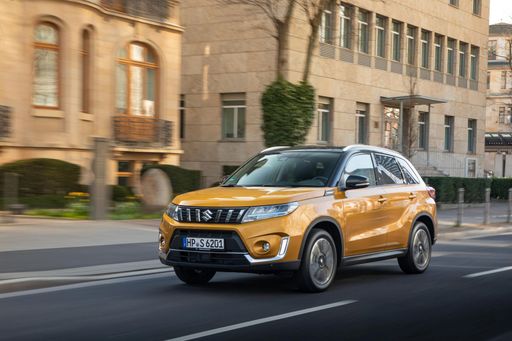 @ Suzuki Motor Corporation
@ Suzuki Motor Corporation
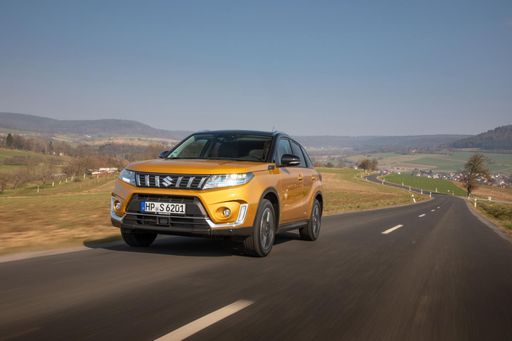 @ Suzuki Motor Corporation
@ Suzuki Motor Corporation
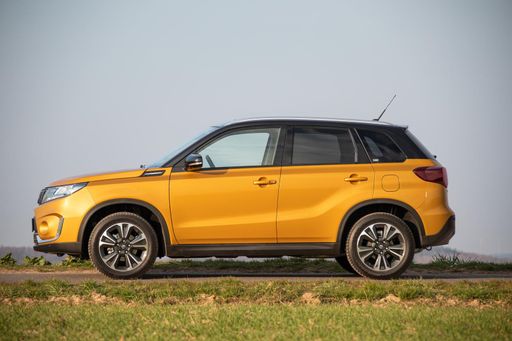 @ Suzuki Motor Corporation
@ Suzuki Motor Corporation
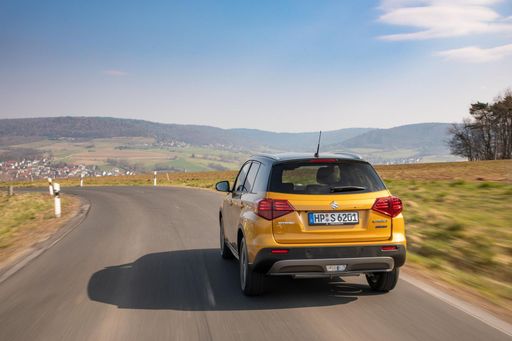 @ Suzuki Motor Corporation
@ Suzuki Motor Corporation
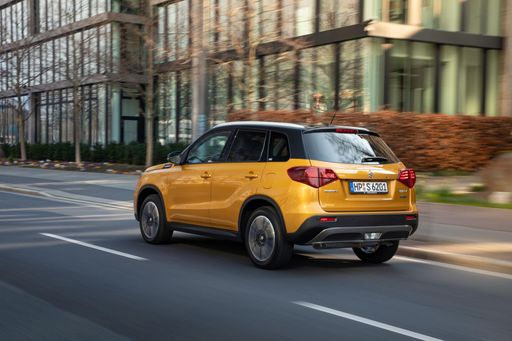 @ Suzuki Motor Corporation
@ Suzuki Motor Corporation
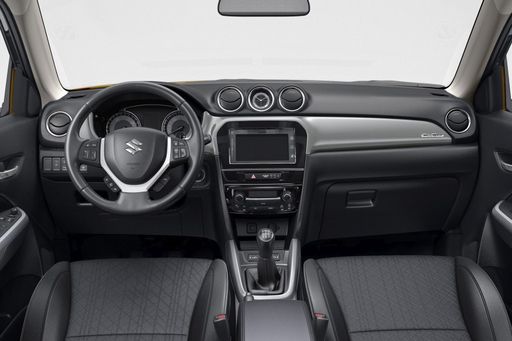 @ Suzuki Motor Corporation
@ Suzuki Motor Corporation
VW Tiguan
The VW Tiguan blends sensible family practicality with a dash of German polish, delivering a calm, reassuring ride and a cabin that never feels like an afterthought. For buyers who want an SUV that’s easy to live with yet still nicely dressed, the Tiguan is the grown‑up choice that keeps a cheeky wink in reserve.
details @ Volkswagen AG / VW Media
@ Volkswagen AG / VW Media
 @ Volkswagen AG / VW Media
@ Volkswagen AG / VW Media
 @ Volkswagen AG / VW Media
@ Volkswagen AG / VW Media
 @ Volkswagen AG / VW Media
@ Volkswagen AG / VW Media
 @ Volkswagen AG / VW Media
@ Volkswagen AG / VW Media
 @ Volkswagen AG / VW Media
@ Volkswagen AG / VW Media
 @ Suzuki Motor Corporation
@ Suzuki Motor Corporation
|
 @ Volkswagen AG / VW Media
@ Volkswagen AG / VW Media
|
|
|
|
Costs and Consumption |
|
|---|---|
|
Price
23600 - 30900 £
|
Price
32800 - 51900 £
|
|
Consumption L/100km
5 - 5.9 L
|
Consumption L/100km
1.4 - 8.4 L
|
|
Consumption kWh/100km
-
|
Consumption kWh/100km
-
|
|
Electric Range
-
|
Electric Range
118 - 126 km
|
|
Battery Capacity
-
|
Battery Capacity
19.70 kWh
|
|
co2
113 - 138 g/km
|
co2
32 - 190 g/km
|
|
Fuel tank capacity
47 L
|
Fuel tank capacity
45 - 58 L
|
Dimensions and Body |
|
|---|---|
|
Body Type
SUV
|
Body Type
SUV
|
|
Seats
5
|
Seats
5
|
|
Doors
5
|
Doors
5
|
|
Curb weight
1255 - 1395 kg
|
Curb weight
1599 - 1890 kg
|
|
Trunk capacity
289 - 375 L
|
Trunk capacity
490 - 652 L
|
|
Length
4185 mm
|
Length
4539 mm
|
|
Width
1775 mm
|
Width
1842 - 1859 mm
|
|
Height
1595 mm
|
Height
1656 - 1658 mm
|
|
Max trunk capacity
1046 - 1120 L
|
Max trunk capacity
1486 - 1650 L
|
|
Payload
375 - 400 kg
|
Payload
460 - 533 kg
|
Engine and Performance |
|
|---|---|
|
Engine Type
Petrol MHEV, Full Hybrid
|
Engine Type
Petrol, Petrol MHEV, Diesel, Plugin Hybrid
|
|
Transmission
Manuel, Automatic
|
Transmission
Automatic
|
|
Transmission Detail
Manual Gearbox, Automated Manual, Automatic Gearbox
|
Transmission Detail
Dual-Clutch Automatic
|
|
Drive Type
Front-Wheel Drive, All-Wheel Drive
|
Drive Type
All-Wheel Drive, Front-Wheel Drive
|
|
Power HP
110 - 129 HP
|
Power HP
130 - 272 HP
|
|
Acceleration 0-100km/h
9.5 - 12.7 s
|
Acceleration 0-100km/h
5.9 - 10.6 s
|
|
Max Speed
180 - 190 km/h
|
Max Speed
198 - 242 km/h
|
|
Torque
235 Nm
|
Torque
220 - 400 Nm
|
|
Number of Cylinders
4
|
Number of Cylinders
4
|
|
Power kW
81 - 95 kW
|
Power kW
96 - 200 kW
|
|
Engine capacity
1373 - 1462 cm3
|
Engine capacity
1498 - 1984 cm3
|
General |
|
|---|---|
|
Model Year
2024 - 2025
|
Model Year
2024 - 2025
|
|
CO2 Efficiency Class
D, C, E
|
CO2 Efficiency Class
G, D, E, F, B
|
|
Brand
Suzuki
|
Brand
VW
|
What drivetrain options does the Suzuki Vitara have?
Available configurations include Front-Wheel Drive or All-Wheel Drive.
The prices and data displayed are estimates based on German list prices and may vary by country. This information is not legally binding.
